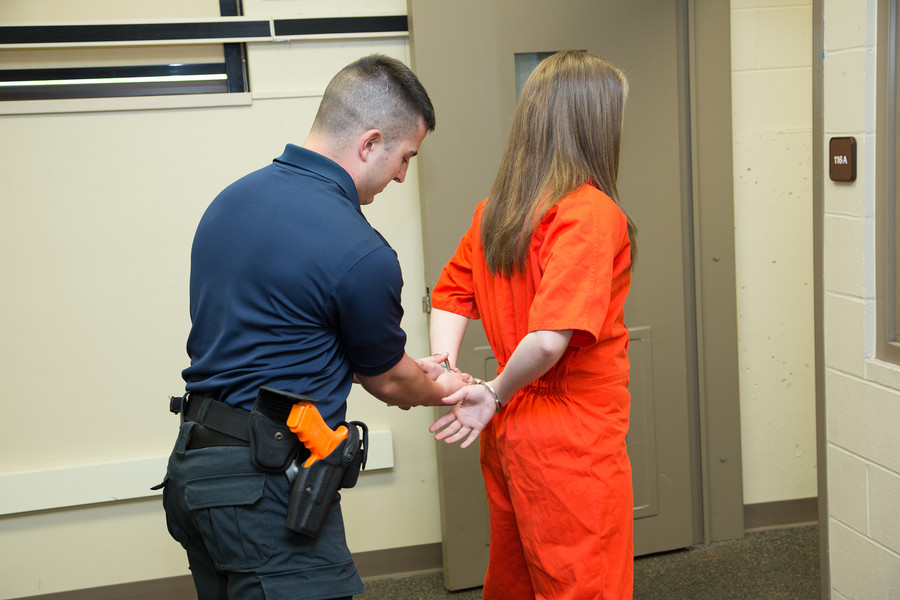Criminal Justice Correctional Officer
Prepare for a career in corrections. The program includes instruction in professional communications, corrections security, and emergency procedures. The program also provides a foundation to prepare the student for future promotion. Students will complete the 200-hour Basic Jail Officer Academy in their first year of the program.
This program is the suggested Criminal Justice track for students planning on transferring to a four-year university prior to entering the workforce or seeking a career in criminal justice that does not require certification as a law enforcement officer.
Program Outline
| Course # | Course Title | Credits |
|---|---|---|
| 1050410500 | Introduction to PolicingDescriptionThis course focuses on the philosophy and history of policing, limitations imposed on law enforcement in a democratic society in accordance with the Constitution; and the role and place of law enforcement in the total criminal justice process. |
3.00 |
| 1080119500 | Written CommunicationDescriptionDevelops writing skills which include prewriting, drafting, revising, and editing. A variety of writing assignments is designed to help the learner analyze audience and purpose, research and organize ideas, and format and design documents based on subject matter and content. Also develops critical reading and thinking skills through the analysis of a variety of written documents. |
3.00 |
| 1050490700 | Community Policing StrategiesDescriptionDeals with the sociological aspects of police-community interactions. The dynamics of a diverse society are explored in order to develop the necessary knowledge, skills, and attitudes that reflect understanding of the diversity within communities. |
3.00 |
| 1080119600 | Oral Interpersonal CommunicationDescriptionFocuses upon developing speaking, verbal and nonverbal communications, and listening skills through individual presentations, groups activities, and other projects. |
3.00 |
| 1080919900 | Psychology of Human RelationsDescriptionFocuses on improving personal and job-related relationships through understanding and applying sound psychological principles. Topics include self-concept, motivation, emotions, stress management, conflict resolution, and human relation processes. |
3.00 |
| Course # | Course Title | Credits |
|---|---|---|
| 1050410000 | Introduction to CorrectionsDescriptionThis class will provide a foundation to students that will enter the corrections profession. The course will cover Ethics and Ethical Decision Making, Professional Communication Skills, Report Preparation, and Correctional Law. The course is aligned with the State of Wisconsin DOJ Jail Academy requirements. |
3.00 |
| 1050492000 | Corrections Security ProceduresDescriptionLearners will demonstrate the steps involved in receiving and releasing inmates, maintaining security, and practicing the basic principles of supervision and behavior control. Topics include: admission, release, and search procedures; use of jail locking and surveillance equipment; principles of supervision; and inmate health management procedures. All procedures are consistent with the DOJ Jail Certifiability Standards. Covers DOJ topics introduction to POSC, admit and release inmates, inmate supervision and behavior control, supervision of special inmates/crisis intervention, maintenance of jail security, supervision of juveniles, and personal stress management. |
3.00 |
| 1080410700 | College MathematicsDescriptionDesigned to review and develop fundamental concepts of mathematics pertinent to the areas of arithmetic and algebra, geometry and trigonometry, probability and statistics. Special emphasis is placed on problem solving, critical thinking and logical reasoning, making connections, and using calculators. Topics include performing arithmetic operations and simplifying algebraic expressions, solving linear equations and inequalities in one variable, solving proportions and incorporating percent applications, manipulating formulas, solving and graphing systems of linear equations and inequalities in two variables, finding areas and volumes of geometric figures, applying similar and congruent triangles, converting measurement within and between U.S. and metric systems, applying the Pythagorean Theorem, solving right and oblique triangles, calculating probabilities, organizing data and interpreting charts, calculating central and spread measures, and summarizing and analyzing data. Recommended: pre-algebra or appropriate placement scores. Prerequisite: Accuplacer Algebra score >=35 or ACT Mathematics score >=18. |
3.00 |
| 1050492100 | Corrections Emergency ProceduresDescriptionLearners will demonstrate the Principles of Subject Control (POSC) in a correctional environment with an emphasis on team tactics, and will develop the skills needed for mitigation of hostage-type situations. Learners will apply current fire science concepts to jail fire-prevention and response, including search and rescue, fire suppression, and use of safety equipment. This course will include DOJ topics POSC, jail hostage response, jail health care, jail fire safety, and CPR. |
3.00 |
| 1080916600 | Intro to Ethics Theory and ApplicationDescriptionProvides a basic understanding of the theoretical foundations of ethical thought. Diverse ethical perspectives will be used to analyze and compare relevant issues. Students will critically evaluate individual, social and/or professional standards of behavior, and apply a systematic decision-making process to these situations. |
3.00 |
| 1080917200 | Introduction to Diversity StudiesDescriptionIntroduces learners to the study of diversity from a local to a global environment using a holistic, interdisciplinary approach. Encourages self-exploration and prepares the learner to work in a diverse environment. In addition to an analysis of majority/minority relations in a multicultural context, the primary topics of race, ethnicity, age, gender, class, sexual orientation, disability, and religion are explored. |
3.00 |
| Course # | Course Title | Credits |
|---|---|---|
| 3050450300 | Overview of Criminal JusticeDescriptionThrough classroom lecture and WI Department of Justice 720 Academy integration exercises, students will learn and apply skills addressed in the following WI Department of Justice 720 Academy Phase I curriculum framework topics: Academy Orientation, Fundamentals of Criminal Justice, Ethics, Cultural Competency, Agency Policy, and Professional Communication. |
1.00 |
| 3050450600 | Overview of InvestigationsDescriptionThrough classroom lecture, on-campus lab, and WI Department of Justice 720 Academy integration exercises students will learn and apply skills addressed in the following Department of Justice 720 Academy curriculum framework Phase I topics: Constitutional Law I, Crimes I, Interviews, and Report Writing. The DOJ Phase I Written Examination will be administered in this course. |
2.00 |
| 1050490200 | Criminal LawDescriptionDeals specifically with substantive criminal law which includes an understanding of acts or omissions, the mental state, and other essential elements, all of which combine to constitute a crime. |
3.00 |
| 1050412900 | Interviewing TechniquesDescriptionDescribes the purposes and mechanics of conducting proper interviews and interrogations, as well as securing and recording confessions. Special emphasis is given to psychological and legal aspects of various interviewing techniques. |
3.00 |
| 1055011000 | Understanding AddictionDescriptionThis course provides information based on the history, changing trends, and concepts of chemical dependence. It also assists in examining the various types of addictions within current culture(s). Attention will be focused on the impact of society on these trends and depicts the biology of psychoactive drugs. The course will also Illustrate the etiology of addiction from the varying perspectives. |
3.00 |
| 1050414000 | Computer Utilization for Criminal JusticeDescriptionIntroduces the learner to the use of computer and internet technologies available to the criminal justice practitioner. Students will learn the fundamentals of computer usage, internet research methods and resources, fundamental investigative techniques of cyber-crimes, and the specialized use of criminal justice software for crime scene reconstruction and suspect facial reconstruction. |
3.00 |
| Course # | Course Title | Credits |
|---|---|---|
| 1019616000 | Leadership Qualities of LeadersDescriptionThis course covers the importance of effective leaders and leadership to the success of organizations. Students will explore the critical differences between managers and leaders. |
1.00 |
| 1019616500 | Leadership Emotional IntelligenceDescriptionThis course introduces emotional intelligence and its importance in leadership. Leadership qualities and best practices are also covered. Students will assess their emotional intelligence level and leadership acumen and create action plans to leverage and strengthen these skills. |
1.00 |
| 1019617000 | Leadership Organizational CultureDescriptionThis class will cover what the leader’s role is in creating the optimal workplace. Students will learn the components of a great workplace and how to improve corporate culture. Students have the opportunity to assess their workplace and provide recommendations for strengthening. |
1.00 |
| 1050415500 | Careers in Corrections and CounselingDescriptionThis course is designed to help the student to explore careers in corrections and counseling that lay outside of the County Jail. Students will research careers in community corrections, extended supervision, counseling, federal level corrections, state level corrections and more. There will be three research projects that the students will complete through the term. |
3.00 |
| 1052010500 | Boundaries and EthicsDescriptionThis course will examine topics related to ethics and boundaries specific to the field of substance abuse. Students will review and examine the ethical code of substance abuse professionals. Learners will be able to incorporate these ethical standards into a thinking cycle to promote positive solution focused decision-making skills. These skills are evaluated through performance assessment tasks such as analyzing case study scenarios, personal reflection assignments, and in-depth classroom participation. Prerequisite: 1052010000 Introduction to Counseling (C or better). |
3.00 |
| 1052010600 | Methods in Social CaseworkDescriptionThis course will prepare the learner for implementing case management techniques used in substance abuse treatment. It will incorporate the twelve core functions of a substance abuse professional and demonstrate how these core functions are implemented in practice. Learners will have the ability to complete the intake process, a bio-psychosocial assessment as well as create individual and client centered treatment plans, coordinate care by making appropriate referrals based on AODA and Mental Health guidelines, and follow up with those referrals. Prerequisite: 1052010000 Introduction to Counseling (C or better). |
3.00 |
| 1055011500 | Family Systems and AODADescriptionThis course examines the role of the family with regard to addiction. Additionally, the course introduces family systems theory and provides an overall foundation for understanding the dynamics of family interaction from an AODA perspective. Students will evaluate ethical and boundary issues which are common when working in substance abuse. Prerequisite: 1055011000 Understanding Addiction (C or better). |
2.00 |
At A Glance
How You'll Learn
On Campus
Term Start Dates
| Summer 2024: May 6 | Fall 2024: August 26 | Spring 2025: January 13 |
Start dates represent the beginning of a new term. Certain programs or courses may not be available to start every term. Please view the course schedules for a list of upcoming classes or contact the Welcome Center at 715-365-4493.
Program Tuition*
$10,822
Books & Supplies*
$204
*Total cost for degree completion is estimated by current course requirements, books, and supplies. Tuition and fees are set by the Wisconsin Technical College System and subject to change.
Financial Aid Eligible
Potential Indirect Costs
You may experience these additional costs, not charged by Nicolet, estimated based on length of program.
What You'll Learn
- Examine the role jails and correctional facilities in the criminal justice system
- Adhere to the professional code of ethics for a corrections officer
- Examine the interrelationship between substance abuse, mental illness, and corrections
- Understand the roles and responsibilities of Corrections Officers in county jails
- Apply professional communication skills
- Interact effectively with coworkers and inmates
Transfer Opportunities
Take a look at our transfer agreements to seamlessly transfer your degree to a 4-year university.
Your Potential Careers
- Correctional Officer
Median Annual Salary
| $49,893 | $42,682 | $44,325 |
| Local | State | National |
|---|
EMSI 2020.1
Get Started
Your application can be submitted online, it takes just a few minutes to complete.

Related Programs

Become a Student

Earn a Bachelor's Degree

Prepare for College

